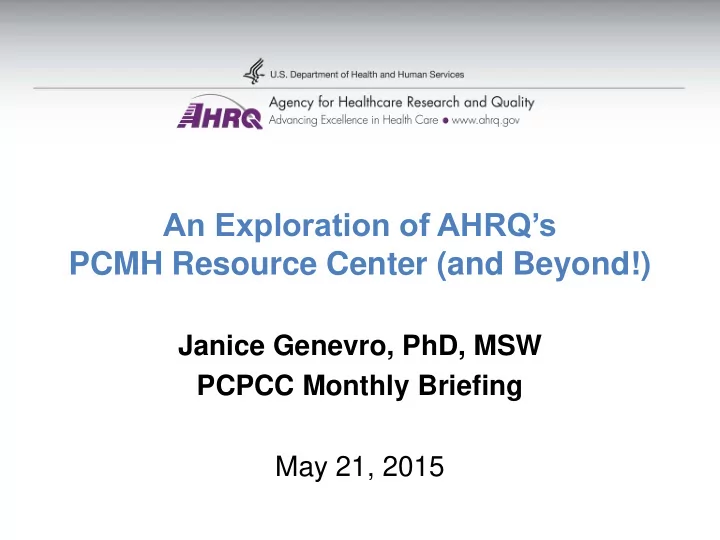

An Exploration of AHRQ’s PCMH Resource Center (and Beyond!) Janice Genevro, PhD, MSW PCPCC Monthly Briefing May 21, 2015
Session Overview Acknowledgements Quick primer on the Agency for Healthcare Research and Quality (AHRQ) AHRQ’s resources for primary care transformation Implementation Quality Improvement Research and Evaluation Additional AHRQ resources 2
Contributors to this work AHRQ Mathematica Policy Research • Deborah Peikes • David Meyers • Erin Fries Taylor • Robert McNellis • Cindy Brach • Alexander Bohn • Hannah Burak • Michael Harrison • Jay Crosson • Kristin Geonnotti • Tricia Higgins • Lyndee Knox (LA Net) • Dana Petersen • and many others 3
AHRQ’s Mission Statement To produce evidence to make health care: safer higher quality more accessible, equitable, and affordable To work with HHS and other partners to make sure that the evidence is understood and used. www.ahrq.gov 4
AHRQ Priorities Improve health care quality by accelerating implementation of Patient-Centered Outcomes Research Make health care safer by preventing HAIs and reducing other harms and accelerating patient safety improvements Increase accessibility by evaluating Affordable Care Act coverage expansions Improve health care affordability, efficiency, and cost transparency 5
Revitalizing the nation’s primary care system is foundational to achieving AHRQ’s mission of improving the quality, safety, accessibility, equity and affordability of health care for all Americans 6
AHRQ Resources for Primary Care Transformation Resources developed specifically for primary care ► PCMH Resource Center web site ► Primary Care Measures databases ► Improving Primary Care Practice – Information for Health Professionals Other useful AHRQ resources ► Innovations Exchange ► Health IT ► Clinical Decision Support ► National Quality Measures Clearinghouse (NQMC) ► National Guideline Clearinghouse (NGC) 7
Information Hubs 8
PCMH Resource Center 9 http://www.pcmh.ahrq.gov/
Implementing the PCMH – Transforming Primary Care 10
What is a Practice Facilitator? ► Practice facilitators are specially trained individuals who work with primary care practices “to make meaningful changes designed to improve patients’ outcomes. [They] help physicians and improvement teams develop the skills they need to adapt clinical evidence to the specific circumstance of their practice environment” (DeWalt, Powell, Mainwaring, et al., 2010) 11
AHRQ’s Portfolio of Practice Facilitation Products Competency-based curriculum for training entry-level practice facilitators Model Curriculum Coming summer 2015 PF How to Handbook Guide Essentials for Support for teaching and organizations learning the interested in knowledge and starting PF skills for a new PF programs http://www.pcmh.ahrq.gov/page/practice-facilitation 12
Development of a Model Curriculum for Training Practice Facilitators • Objective ► Provide entry-level training for PFs to assist primary care practices in achieving their quality improvement and transformation goals ► Builds upon AHRQ’s Practice Facilitation Handbook • Key Characteristics ► Links with competencies and includes specific learning objectives ► Instructor’s guide including guidance for assessment ► Student materials and other supporting information • Available Summer 2015 13
Quality Improvement Two New Resources Companion resources for QI paper Webinar on Health IT paper www.pcmh.ahrq.gov/page/p cpf-webinars Webinar on QI paper coming soon! http://www.pcmh.ahrq.gov/page/quality-safety 14
Lessons Learned about Transformation • A strong foundation is needed for successful redesign • The process of transformation can be a long and difficult journey • Approaches to transformation vary • Visionary leadership and a supportive culture can ease the way for transformation • Contextual factors are inextricably linked to outcomes 15
Evidence and Evaluation 16
Improving PCMH Research and Evaluation Practical advice Information about novel methods Guidance for decision makers http://www.pcmh.ahrq.gov/page/ evidence-and-evaluation Methods Webinar Series http://www.ahrq.gov/professionals/systems/system/advanced-methods/index.html 17
PCMH Citations Database http://www.pcmh.ahrq.gov/page/pcmh-citations-collection 18
primarycaremeasures.ahrq.gov 19
Improve research and build evidence in 4 key areas Separate resources for care coordination, team-based care, integration of behavioral health, and clinical-community linkages Database features: Include conceptual models Comprehensive measure profiles Searchable by multiple characteristics Search results can be saved and downloaded 20
Improving Primary Care Practice: Information on ahrq.gov for Health Care Professionals http://www.ahrq.gov/professionals/prevention-chronic-care/improve/index.html 21
Care Coordination and the Medical Neighborhood • Information to support systems redesign to improve referral processes between primary care, specialty care practices, and community services • Improving research and the evidence base – measure Taylor EF, Lake T, Nysenbaum J, Peterson G, Meyers development work D. Coordinating care in the medical neighborhood: critical components and available mechanisms. June 2011. 22
Enhanced Care Delivery Resources • In order to deliver accessible, coordinated, comprehensive, patient-centered care ► It requires a team Primary care teams 23
Helping Build Teams http://teamstepps.ahrq.gov/ 24
Integration of Primary Care and Behavioral Health 25 http://integrationacademy.ahrq.gov/
Self-Management Support • What is self-management support? Why is it important? How can it be implemented in practice? • Resources for clinicians, clinical teams, health systems, and consumers 26 http://www.orau.gov/ahrq/sms_home.html
AHRQ Resources for Patient and Family Engagement • Engaging Patients and Families in the Medical Home (white paper) • Strategies to Put Patients at the Center of Primary Care (decisionmaker brief) Resources that describe how decisionmakers can encourage a model of care that truly reflects the needs, preferences, and goals of patients and families. http://www.pcmh.ahrq.gov/page/patient-centered-care • Health Literacy and Cultural Competency Resources Resources, such as the Health Literacy Universal Precautions Toolkit, to help primary care practices reduce the complexity of health care, increase patient understanding of health information, and enhance support for patients of all health literacy levels. http://www.ahrq.gov/health-care-information/topics/topic-health-literacy.html 27
AHRQ’s Innovations Exchange https://innovations.ahrq.gov/ 28
AHRQ’s Innovations Exchange • Building Relationships Between Clinical Practices and the Community to Improve Care https://innovations.ahrq.gov/scale-up-and-spread/building-relationships-between- clinical-practices-and-community-improve-care • Award- winning series of 3 videos on Vermont’s Blueprint for Health program https://innovations.ahrq.gov/videos/blueprint-health-working-together-better-care-1-3 29
Getting Health IT to Work for You 30 http://healthit.ahrq.gov/
Clinical Decision Support Preventive Services Recommendations www.healthfinder.gov www.epss.ahrq.gov 31
Additional resources for Quality Improvement and Evidence-Based Care National Quality Measures Clearinghouse http://www.qualitymeasures.ahrq.gov/ National Guideline Clearinghouse http://www.guideline.gov/ 32
AHRQ’s Resources for Primary Care Transformation Questions? 33
Thank you! Jan Genevro janice.genevro@ahrq.hhs.gov
Recommend
More recommend